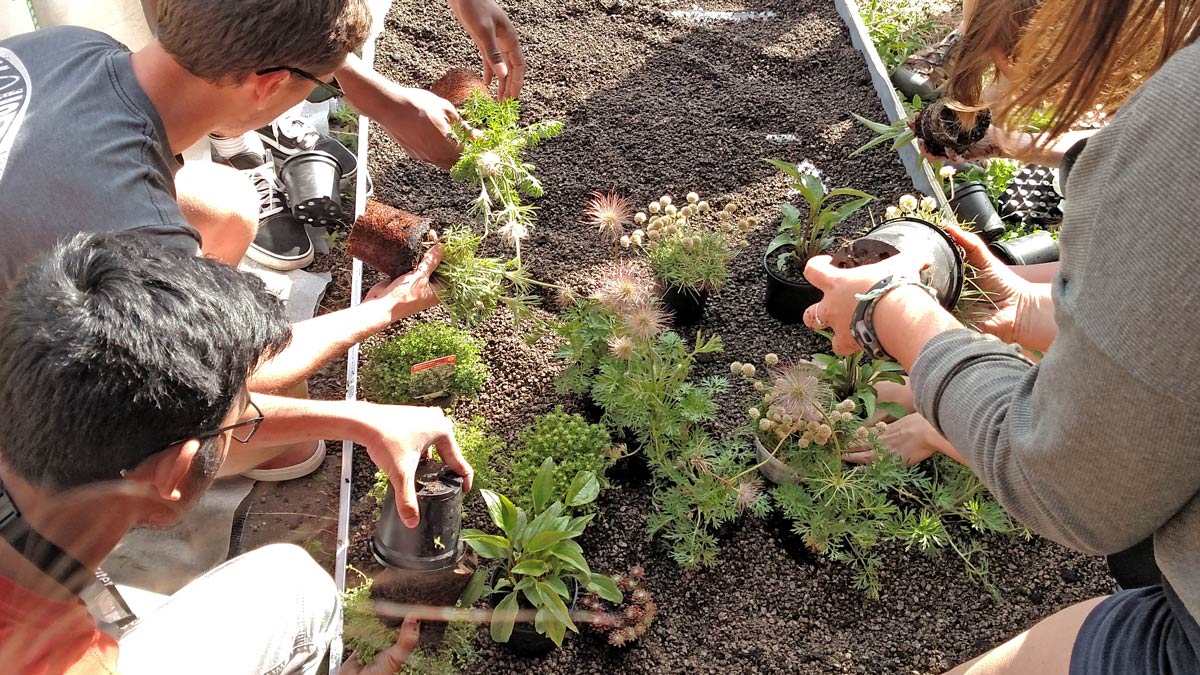Environmental Science Bachelor of Science Degree

Environmental Science
Bachelor of Science Degree
- RIT /
- Rochester Institute of Technology /
- Academics /
- Environmental Science BS
Create a sustainable future for our planet in this innovative bachelor’s degree in environmental science, where you’ll combine a love for nature with cutting-edge research.
Overview for Environmental Science BS
Why Pursue a Bachelor’s Degree in Environmental Science at RIT
Undergraduate Research Opportunities: Conduct research in environmental issues, conservation, ecology, agriculture, sustainability, and other fields.
Unique Hands-On Field Work: Complete field work and research at Tait Preserve of RIT, study urban ecology in Malmo, Sweden, or spend two weeks studying ecology and evolution on the Galápagos Islands.
Dynamic Capstone Experience: Work with outside partners to provide solutions to environmental problems or create educational and outreach activities for the community.
Pre-Med/Pre-Health and Pre-Vet Advising Programs: Receive personalized guidance to become a competitive candidate for admission to medical and veterinary schools and graduate programs in the health professions.
Direct Path to Medical School: RIT’s partnership with the University of Buffalo’s Jacobs School of Medicine offers eligible pre-health/pre-med students early admission and mentorship through the Early Opportunity Program in Medicine.
In-Demand Job Opportunities: Recent environmental science graduates are employed at The Nature Conservancy, U.S. Fish and Wildlife Service, Saguaro National Park, Rochester Museum & Science Center, and Triumvirate Environmental.
Accelerated Bachelor’s/Master’s Available: Earn both your bachelor’s and your master’s in less time and with a cost savings, giving you a competitive advantage in your field.
STEM-OPT Visa Eligible: The STEM Optional Practical Training (OPT) program allows full-time, on-campus international students on an F-1 student visa to stay and work in the U.S. for up to three years after graduation.
Earning an environmental science degree from RIT provides you with the problem-solving skills needed to be successful in the field. This major combines a love for nature with cutting edge research to create a sustainable future for our planet.
What is Environmental Science?
Environmental science is an interdisciplinary field that combines scientific methods and disciplines to identify, understand, and address the real world environmental challenges we face, from renewable energy to climate change and more. Environmental scientists and geoscientists use their knowledge of the physical makeup and history of the Earth to protect the environment; locate water, mineral, and energy resources; predict future geologic hazards; and offer environmental site assessments and advice on indoor air quality, hazardous waste site remediation, and construction and land-use projects.
Environmental scientists solve problems relating to power generation, waste reduction and recycling, pollution control, land use, and land cover change, preserving biodiversity and ecological services, transportation, forestry, agriculture, economics, and a wide range of other areas. They study our relationship to nature and to each other, developing solutions that prevent or reverse environmental deterioration and work toward sustainability.
RIT’s Bachelor’s Degree in Environmental Science
Meeting the challenges that face environmental scientists requires problem-solving abilities based in science, mathematics, the social sciences, and other disciplines. RIT’s environmental science major is an interdisciplinary degree with a strong foundation in biology, mathematics, chemistry, and geographic information systems. The major provides you with both the education and hands-on experiences you’ll need to be successful in the field.
Environmental Science Courses
In the environmental science major, you’ll complete courses in biology, chemistry, ecology, environmental studies, geographic information systems, geography, public policy, and other areas of study. Your study of environment science includes concentration courses from the following topic areas:
- Cell and molecular biology: Explore molecular biology, environmental microbiology, population genetics, and evolutional biology.
- Chemistry: Study clean energy, climate change, environmental chemistry, and infectious diseases.
- Ecology and field biology: Investigate evolutionary biology, urban ecology, wetlands, and freshwater ecology.
- Economics: Understand global economic issues, natural resource economics, urban economics, and macro-and micro-economics.
- Mathematics: Utilize graph theory, differential equations, linear algebra, and more.
- Organismal biology and evolution: Study zoology, developmental biology, evolutionary biology, and marine biology
- Public policy: Learn about policy formation and its impacts on environmental policy, energy policy, and science and technology policy.
- Remote sensing and digital image processing: Explore how remote sensing and imaging can impact the assessment of natural resources and detect change in ecosystems.
- Statistics: Analyze data models and statistical techniques used in computational molecular biology.
Enhance Your Environmental Science Degree with a Minor or Immersion
RIT’s 185+ minors and immersions offer you an opportunity to pair your environmental science degree with a range of topics that can enhance your studies, provide a deeper understanding of a sub-topic of environmental studies, sustainability, or ecology (such as biology: ecology and evolution, climate change: an interdisciplinary problem, environmental studies, geographic information systems, urban studies, and water resources, to name a few), or allow you to explore a personal area of interest.
Meaningful, Hands-On Environmental Field Work
Explore the Galápagos Islands
In our semester-long course, Galápagos: Ecology and Evolution, you’ll meet during spring semester to learn about the wildlife and geology of the Galápagos islands, and about their influence on Darwin’s Theory of Evolution. The Galápagos is still an area of vibrant research and students will be introduced to current ecological, genetic, and geological studies. The class will explore ongoing difficulties of balancing human needs with environmental conservation in the Galápagos. At the end of the course, you’ll spend 14 days on the Galápagos Islands where you’ll visit various sites on the islands, with excursions focusing on its unique wildlife and geology.
Study Urban Ecology in Sweden
Travel to Malmo, Sweden, for two weeks to work and learn alongside students from Malmo University where you’ll explore green infrastructure, sustainable design, and low impact transportation systems in Sweden. You’ll also collaborate on group projects and participate in field trips around Malmo, collecting data and conducting analyses.
Explore additional study abroad opportunities where you can add a global perspectives to your environmental science degree.
Tait Preserve at RIT
You’ll benefit from a variety of field experiences onsite at RIT’s Tait Preserve, a diverse landscape of hills, deciduous hardwood forests, and open meadows in addition to the 60-acre Redman Lake and Irondequoit Creek, which flows through the property. The preserve is home to a menagerie of animals, including deer, turkey, beaver, fox, coyotes, and a wide variety of spectacular migratory and non-migratory birds. Students and faculty utilized these natural resources to conduct research across various disciplines.
Furthering Your Study of Environmental Science
Today’s careers require advanced degrees grounded in real-world experience. RIT’s Combined Accelerated Bachelor’s/Master’s Degrees enable you to earn both a bachelor’s and a master’s degree in as little as five years of study, all while gaining the valuable hands-on experience that comes from co-ops, internships, research, study abroad, and more.
Pair your environmental science BS degree with a master’s degree to further broaden your knowledge:
- Environmental Science BS/MS: In this comprehensive accelerated dual degree in environmental science, you’ll build a foundation in core biological, geospatial, and environmental concepts and skills. Along the way, you’ll collaborate with community partners like the Seneca Park Zoo and Rochester Science Museum to develop solutions to pervasive problems like habitat loss, invasive species and stormwater pollution. The course work in the environmental science MS incorporates additional advanced environmental concepts, public policy education, data analysis skills, and independent research and fieldwork addressing key environmental challenges like microplastic pollution, climate change, wetland restoration, and more. This accelerated program prepares you for careers at places like the Nature Conservancy, US Environmental Protection Agency, LaBella Associates, Microvi Biotechnologies Inc., and more.
- Environmental Science BS/Science, Technology and Public Policy MS: The BS in environmental science coupled with MS in science, technology and public policy offers an advanced degree for students seeking to couple their scientific interests with interests in government, policy, and the social sciences.
- +1 MBA: Students who enroll in a qualifying undergraduate degree have the opportunity to add an MBA to their bachelor’s degree after their first year of study, depending on their program. Learn how the +1 MBA can accelerate your learning and position you for success.
Many graduates choose to pursue one of RIT’s graduate degree programs in environmental studies and sustainability, such as the MS in environmental science, MS in environmental health and safety management, MS in sustainable systems, or the Ph.D. in sustainability.
Pre-Med/Pre-Health Advising
RIT’s Office of Pre-Health Advising offers an advising program that’s open to all majors and provides personal, individualized academic counseling to help you create a comprehensive long-term strategy to assist you in building successful applications to medical, dental, and veterinary schools or graduate degrees in the health professions (e.g., occupational therapy, physical therapy, etc.). Our pre-health advisors will have in-depth conversations with you around critical topics that include academic planning and course selection, MCAT and other admission exams, undergraduate research opportunities, clinical experiences and field work, timelines, and much more. Learn more about pre-med/pre-health advising.
Pre-Vet Advising
RIT’s pre-vet advising program provides personalized support to help you prepare successful applications for veterinary medical school. Pre-vet advising offers guidance on course selection, veterinary and animal care experience requirements, the veterinary school application process, and more. Learn about RIT’s pre-vet advising program.
RIT/University of Buffalo’s Early Opportunity Program in Medicine
RIT pre-health/pre-med students have a direct path to medical school through an RIT partnership with the Jacobs School of Medicine and Biomedical Sciences at the University at Buffalo (UB). The Early Opportunity Program in Medicine allows eligible RIT students to secure a pre-admission offer to the Jacobs School while completing their undergraduate degree at RIT. Students accepted into the program gain early access to professional training and mentorship at UB’s medical school, helping them prepare for the demands of medical school and beyond. Learn more about the Early Opportunity Program in Medicine.
-
Join Us for Accepted Student Open House
Visit campus on March 28 or April 11 to meet faculty, tour campus, and ask your questions.
-
Join us for Fall 2026
There's still time to apply. For some programs, applications will be reviewed on a rolling, space-available basis.
Careers and Experiential Learning
Typical Job Titles
| Project Manager | Animal Care Assistant | Environmental Consultant |
| GIS Analyst | Wetland Scientist |
Industries
-
Environmental Services
-
Forestry
-
Natural Resources
-
Scientific and Technical Consulting
Cooperative Education
What’s different about an RIT education? It’s the career experience you gain by completing cooperative education and internships with top companies in every single industry. You’ll earn more than a degree. You’ll gain real-world career experience that sets you apart. It’s exposure–early and often–to a variety of professional work environments, career paths, and industries.
Co-ops and internships take your knowledge and turn it into know-how. Science co-ops include a range of hands-on experiences, from co-ops and internships and work in labs to undergraduate research and clinical experience in health care settings. These opportunities provide the hands-on experience that enables you to apply your scientific, math, and health care knowledge in professional settings while you make valuable connections between classwork and real-world applications.
Co-op is optional for students in the environmental science degree. Student studying environmental science have found cooperative education opportunities with local, state, or federal government agencies, nonprofit environmental organizations, and a host of environmental consulting firms.
Careers in Environmental Science
There is a great need for individuals who have both a strong background in environmental science and the ability to participate in an interdisciplinary problem-solving team. Upon graduation, you will be valued for your broad understanding of environmental science, your depth of knowledge in a particular aspect of environmental science, and your ability to tackle and solve tough environmental problems.
Featured Work and Profiles
-
Tackling the Macro Problem of Microplastics
Environmental science students team up with professors to research the impact microplastics have on the ecosystem and human health.
Read More about Tackling the Macro Problem of Microplastics -
RIT Student Research Featured on the NASA Landsat Science Website
Bianca Cilento, a student at RIT, caught the attention of a program developer which led to her research work being featured on the NASA Landsat Science website.
Read More about RIT Student Research Featured on the NASA Landsat Science Website -
Alumna's Ecological Research Leads to Fulbright Grant
Through a Fulbright Program, environmental science alumna Sydney VanWinkle will head to Madagascar to study the impact that conservation initiatives have on local communities and the environment.
Read More about Alumna's Ecological Research Leads to Fulbright Grant -
Finding Career Success and Achieving Great Things at RIT
Inspired by a community of people on a mission to achieve great things, Nadya Rose ‘14 shares how RIT helped foster her success while pursuing her environmental science degree.
Read More about Finding Career Success and Achieving Great Things at RIT -
A Team Experience That Pays Off In More Ways Than One
Mary Pryor The Laboratory Support Team (or BioPrep) is a unique team that gets hands-on lab experience while helping the many teaching labs in the Thomas H. Gosnell School of Life Sciences at RIT.
Read More about A Team Experience That Pays Off In More Ways Than One -
Tackling Conservation Challenges Head On
Kristen Denninger Snyder ’10 (environmental science) After graduating from RIT, Kristen Denninger Snyder did extensive research on African wildlife at the University of California.
Read More about Tackling Conservation Challenges Head On
Curriculum for 2025-2026 for Environmental Science BS
Current Students: See Curriculum Requirements
Admissions and Financial Aid
This program is STEM designated when studying on campus and full time.
First-Year Admission
First-year applicants are expected to demonstrate a strong academic background that includes:
- 4 years of English
- 3 years of social studies and/or history
- 3 years of mathematics is required and must include algebra, geometry, and algebra 2/trigonometry. Pre-calculus is recommended.
- 2-3 years of science is required and must include biology and chemistry.
Transfer Admission
Transfer applicants should meet these minimum degree-specific requirements:
- A minimum of college algebra is required. Pre-calculus or calculus is preferred.
- Chemistry and biology are required.
Financial Aid and Scholarships
100% of all incoming first-year and transfer students receive aid.
RIT’s personalized and comprehensive financial aid program includes scholarships, grants, loans, and campus employment programs. When all these are put to work, your actual cost may be much lower than the published estimated cost of attendance.
Learn more about financial aid and scholarships
Accreditation
Research
Environmental Science Research
Undergraduate research is strongly encouraged and strengthens your preparation for graduate study or employment. Students are encouraged to participate in undergraduate research experience under the guidance of faculty mentors. Students are also encouraged to apply for summer research internships both at RIT and at other institutions.
Related News
-
November 14, 2025

Students form Interfaith Council
Nearly 2,500 students who engage in spiritual programs and services on campus now have a unified voice in the Interfaith Council, the university’s newest organization.
-
November 4, 2025

Students take the lead in growing sustainability program
The Climate and Sustainability Leadership Program brings together students across all majors to learn through campus discussions and hands-on experiences with Rochester-area partners. The goal is to create leaders in sustainability.
-
February 2, 2024

Students lean into technology and design to improve the environment
Students in Campus Ecology explored how culture, art, science, and design influence their views and understandings of nature. They also discussed how interdisciplinary collaboration and leaning into the intersection of technology, the arts, and design could improve communication and understanding of ecological concepts and sustainability goals.
Contact
- L. Kate Wright
- School Head
- Dean’s Office
- College of Science
- 585‑475‑4669
- lkwsbi@rit.edu
Thomas H. Gosnell School of Life Sciences

























